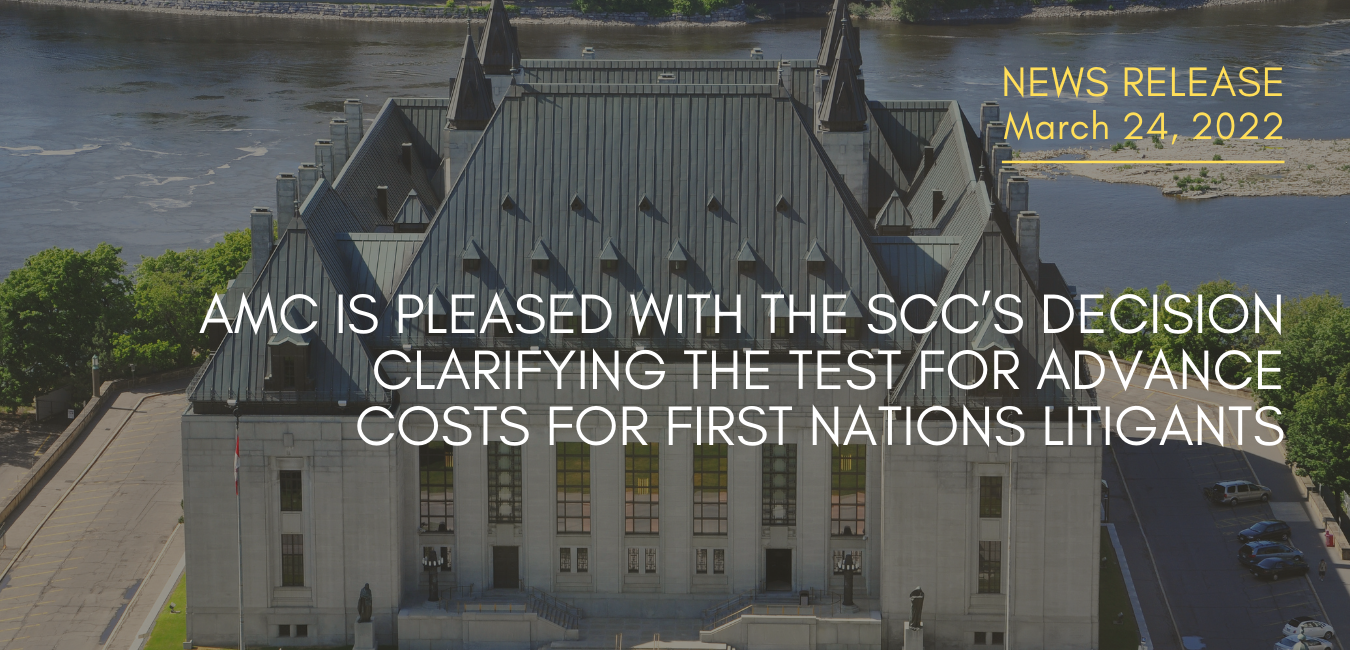AMC is pleased with the SCC’s Decision Clarifying the Test for Advance Costs for First Nations Litigants

March 24, 2022
Treaty One Territory, Manitoba
alexpapineau
Treaty One Territory, Manitoba – The Assembly of Manitoba Chiefs (AMC) is pleased with the decision of the Supreme Court of Canada released March 18 in Anderson v Alberta, which allowed the appeal and remitted the advanced costs application back to the Alberta Court of Queen’s Bench for reconsideration. The advanced costs test is a framework for assessing claims for advance costs to offset the anticipated litigation expenses of public interest litigants, which requires an applicant to demonstrate that it genuinely cannot afford to pay for the litigation, among other things.
The AMC, represented by Carly Fox of Fox Fraser LLP, participated as an intervener at the hearing of the matter on November 4, 2021. The AMC argued that the impecuniosity branch of the advanced costs test must be interpreted in a manner that reflects the context and history of the Crown-First Nations relationship, and which advances reconciliation. Crucially, the AMC argued that the determination of whether a First Nation can genuinely afford the litigation should consider the First Nation’s perspective on what constitutes the basic necessities of life and the spending required to alleviate inequitable standards of living for its citizens.
Aligning with the AMC’s arguments, the Supreme Court of Canada concluded that “in keeping with the imperative of reconciliation”, the impecuniosity requirement “ought to be understood from the perspective of the First Nation government.” When considering an application for advanced costs, a “court may therefore consider the broader context in which a First Nation government sets priorities and makes financial decisions, accounting for competing spending commitments, restrictions on the use of its resources, and fiduciary and good governance obligations.”
Acting Grand Chief Eric Redhead stated, “on behalf of the AMC, I congratulate Beaver Lake Cree Nation on the outcome of its appeal. This decision is important for all First Nations seeking to uphold their inherent and constitutional rights against the Crown. I note that it only became legal for First Nations and their citizens to hire a lawyer in 1951 to defend their rights and land. The AMC intervened on this case because it is very interested in ensuring the perspective of First Nations in Manitoba were included when the Supreme Court of Canada considered advance costs awards for advancing public interest cases for First Nations and others, as it usually still involves cases involving the Crown that has unlimited resources and lawyers. This also means that First Nations with some resources may still receive advance costs awards when prioritizing their resources to meet the pressing needs of their citizens. We are hopeful that First Nations will no longer be forced to choose between funding important litigation to vindicate their rights or their pressing governance requirements.”
Acting Grand Chief Redhead concluded, “Overall, the AMC is pleased by the Supreme Court of Canada’s Nation-to-Nation approach to its decision. The Supreme Court has recognized the important role of First Nations governments, and the importance of understanding and giving credit to the First Nation’s perspective regarding spending priorities. Further, it is important that courts may now take notice of the recognition of contextual factors such as colonialism, displacement, and residential schools and how that history affects First Nations insofar as those factors are relevant to the First Nation’s government’s ability to afford litigation. First Nations have historically suffered at the hands of the Crown, and to ignore that history ignores the root cause of many issues faced by First Nations.”